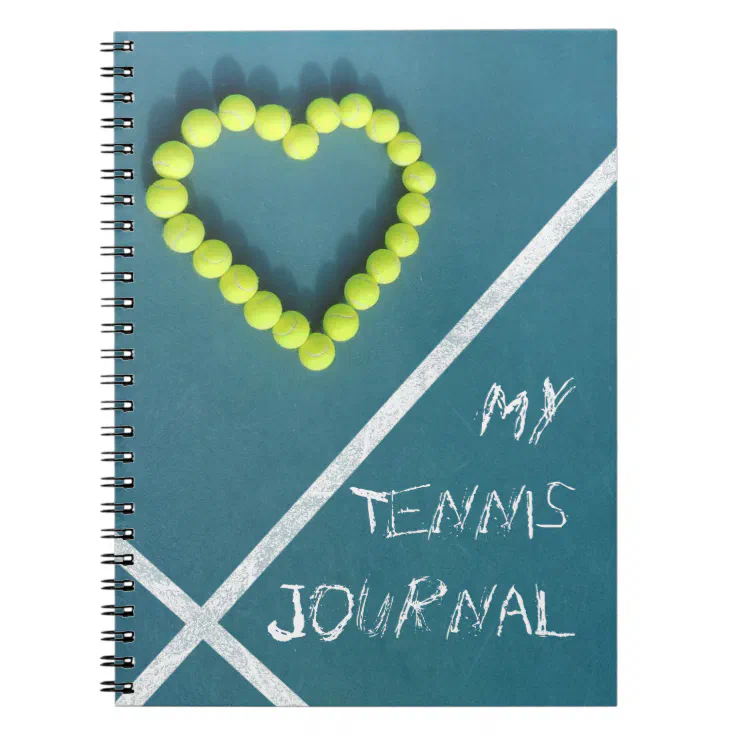The crisp crack of the ball, the rush of adrenaline, the thrill of victory. These are the elements that make tennis such a captivating sport. But beyond the excitement, there’s a deeper layer of personal growth and accomplishment that can be unlocked through dedication and mindfulness. This is where the humble tennis journal comes into play.

Image:
My own journey with journaling began as a way to track my frustrating inconsistency on the court. After a particularly disheartening loss, I decided to record my thoughts, strategies, and performance data. To my surprise, the act of journaling not only helped me analyze my weaknesses but also ignited a newfound passion for continuous improvement. It became a trusted companion and an essential tool for unlocking my full potential as a player.
Boosting Your Tennis Journey: Why a Journal Matters
Beyond its initial purpose as a performance tracker, a tennis journal becomes a powerful tool for self-reflection, revealing patterns and insights that can transform your game. It allows you to capture the nuances of each match, analyze your strengths and weaknesses, and identify specific areas for improvement. Think of it as a treasure map guiding you towards your tennis goals.
The beauty of a tennis journal lies in its versatility. Whether you’re a seasoned pro or a beginner just starting out, it can be adapted to meet your unique needs and objectives. It can serve as a repository for technical details, a platform for strategic brainstorming, a motivational tool for overcoming setbacks, and a space for celebrating milestones.
Unpacking the Potential: What to Track in Your Tennis Journal
Technical Aspects
At its most basic level, a tennis journal can be used as a comprehensive performance tracker. Record the date, opponent, match duration, score, and even the type of court you played on. By tracking these elements, you can easily identify patterns of success or areas that need attention. For example, perhaps you consistently struggle against left-handed players or perform better on hard courts. This type of data can help you tailor your training and game plan accordingly.

Image: www.nationsphotolab.com
Strategic Insights
Beyond the technical details, your journal can become a valuable tool for strategic planning. Note down your pre-match warm-up routine, specific tactical approaches for different opponents, and any observations you make about their playing style. This information can be invaluable when preparing for future matches, allowing you to anticipate an opponent’s moves and adjust your strategy accordingly.
Mental Game
The mental game is just as important as the physical in tennis. Use your journal to track your emotional state before, during, and after matches. Did you feel confident and focused? Were you distracted by nerves or self-doubt? By recognizing these emotional patterns, you can identify strategies to manage your mental game and maintain composure under pressure.
Post-Match Analysis
The most crucial element of effective journaling is post-match analysis. Take time after each match to review your performance, focusing on both positive and negative aspects. Were there specific shots you executed well? Were there mental lapses that contributed to errors? Analyzing these aspects with a critical yet constructive eye can lead to significant improvements in your game.
Harnessing the Power of Journaling for Peak Performance
Consistent journaling can provide a wealth of data for optimizing your training and game strategy. By identifying recurring patterns or weaknesses, you can tailor your practice sessions to address specific areas for improvement. For example, if you notice you consistently struggle with backhand volleys, you can dedicate more practice time to this specific shot.
Moreover, journaling fosters a heightened sense of self-awareness, leading to a deeper understanding of your strengths and weaknesses. This knowledge empowers you to make informed choices about training, equipment, and even your overall game style. The more you analyze your patterns and understand your tendencies, the better equipped you’ll be to make adjustments and consistently perform at your peak.
Expert Tips for Effective Tennis Journaling
Here are some valuable tips to make the most of your tennis journal:
- Set Clear Goals: Before you start writing, define your objectives for journaling. Do you want to improve your backhand, maintain consistent focus, or strategize more effectively? Having clear goals will guide your entries and help you track your progress.
- Be Specific and Detailed: Don’t just write “good match” or “played poorly.” Be precise. Did you struggle with serves or forehand returns? What were the specific errors you made? Specific details will offer valuable insights.
- Review Regularly: Once you’ve accumulated a few weeks or months worth of entries, take time to review them. Look for patterns, trends, and breakthroughs to identify areas for improvement and celebrate your accomplishments.
- Be Honest and Self-Aware: Journaling is a personal journey, so be honest with yourself about your performance, both positive and negative. This honesty is essential for growth and progress.
- Experiment with Formats: Find a journaling method that works best for you. Some players prefer handwritten notes, while others find digital formats or apps more convenient. The key is to find a system that encourages consistent writing.
Tennis Journal FAQs
Here are some common questions about keeping a tennis journal:
Q: How often should I write in my journal?
A: The ideal frequency depends on your goals and schedule. Aim to write after every practice or match, even if it’s just brief notes. You can also jot down thoughts or observations during the day if something strikes you.
Q: What if I don’t have time to write everything down?
A: Don’t worry about capturing every detail. Focus on the most important moments, key decisions, and significant observations. Even a short entry can be valuable.
Q: Can I use a digital journal or app?
A: Absolutely! There are many apps designed specifically for tennis journaling, offering features like performance tracking, video analysis, and even sharing with coaches. Choose what works best for you.
Q: Will journaling actually improve my game?
A: It can! By providing a structured framework for self-reflection and analysis, journaling empowers you to gain deeper insights into your game and identify areas for improvement. It’s a powerful tool for maximizing your potential.
Tennis Journal
Embrace the Journaling Journey
A tennis journal is more than just a record of your performance; it’s a tool for self-discovery, growth, and continuous improvement. By embracing the journey of consistent introspection and analysis, you can unlock your true potential on the court. So, grab your notebook, pen, or digital app, and begin transforming your tennis game today!
Are you ready to embark on your own tennis journaling journey? Let us know in the comments below!

:max_bytes(150000):strip_icc()/OrangeGloEverydayHardwoodFloorCleaner22oz-5a95a4dd04d1cf0037cbd59c.jpeg?w=740&resize=740,414&ssl=1)




